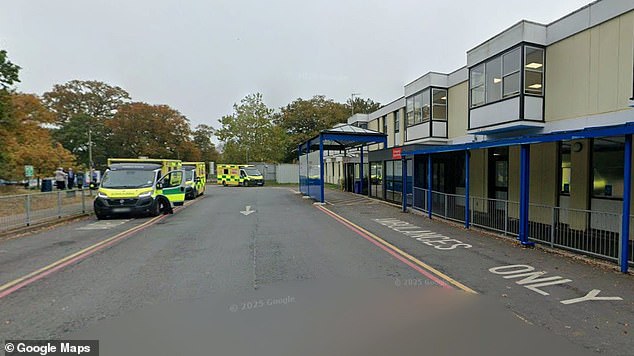AN NHS healthcare assistant died after A&E colleagues at the hospital where he worked failed to spot he had developed a lethal blockage in an artery, an inquest heard.
Cameron Lamb, 28, sought help at the emergency department of Queen Elizabeth Hospital in King’s Lynn, Norfolk – recently rated the worst acute trust in the country – after having a ‘funny turn’ while on a shift.
But doctors there thought he was dehydrated and had a chest infection and sent him home with antibiotics after giving him fluids and paracetamol.
Mr Lamb was found dead at home the following day after his mother raised the alarm and neighbours went to check on him.
A post-mortem examination revealed the cause of death was a pulmonary embolism.
The blockage to the artery feeding the lung can be triggered by a blood clot caused by deep vein thrombosis, a condition commonly caused by long periods of immobility, particularly on flights.
During the inquest in Norwich, Mr Lamb’s family criticised A&E staff for failing to diagnose the condition or ask if he had been on a plane recently.
He had returned from a break in Egypt just five days before he died on July 3 last year.

Cameron Lamb, 28, died after A&E doctors at Queen Elizabeth Hospital in King’s Lynn, Norfolk, failed to realise a blood clot had entered an artery
Dr Sarah Fleming, a consultant radiologist who led an internal investigation at the hospital following Mr Lamb’s death, told the inquest posters had since been placed around the department asking patients to inform staff if they had flown recently.
But Mr Lamb’s mother, Carol Steel, said she found it ‘wholly unacceptable’ that the deadly condition had not been considered, adding ‘standards [had not’] been met’.
‘Why didn’t anybody – from his tan – ask that he may recently have been on holiday?’ she told the coroner.
‘Surely, asking about recent travel is a basic question for staff to ask their patients? So why was this question not asked – unless you can tell me it was?
‘How could A&E have sent a 28-year-old home alone in his condition? It was totally unacceptable to send Cameron home.
‘Cameron was well-known and well-liked across the hospital and we would all like to know how the A&E team misdiagnosed a pulmonary embolism as a chest infection?’
Mr Lamb, who had been employed at the hospital for five years, had been back at work for two days following his holiday when he complained of feeling unwell during his night shift and told his supervisor he needed to go home.
He was urged to go to A&E for a check-up and staff there carried out tests, the inquest at Norfolk Coroner’s Court was told.

The hospital where Mr Lamb worked was recently rated the worst acute trust in the country
The ‘liked’ and ‘thoughtful’ worker, who enjoyed travelling, was given fluids through an IV drip and paracetamol after complaining of palpitations and a high heart rate.
Doctors released him just after midnight and he travelled alone in a taxi to the semi-detached house in West Lynn he shared with his mother.
Ms Steel told the inquest she could see he was ‘breathing heavily’ after she checked via the video doorbell installed at the property.
She became increasingly concerned for him after speaking to him at about 8am and asked neighbours to look in on him.
He was found unresponsive on a sofa and paramedics raced there but he was pronounced dead at the scene.
A nurse who was working at QEH on the night Mr Lamb was taken ill said during the hearing: ‘Cameron said he did not feel well and wanted to go home.
‘I was worried, so I told him to go to A&E and I walked with him to make sure he got checked in.’
She last saw Mr Lamb just before 1am, sitting on stairs outside the hospital waiting for his taxi.

QEH medical director Rebecca Martin said after the inquest that staff had been reminded about the difficulty diagnosing pulmonary embolisms
‘He showed me the prescription of antibiotics from the A&E staff who believed he had a chest infection,’ she added.
‘I was [later] called by a colleague to say he had died. I was shocked. He was loved by all staff and patients.’
Mr Lamb had no history of serious health issues and his last appointment with his GP was a 2022 phone call when he asked for a sick note for work.
Coroner Joanna Thompson accepted that he had died due to the ‘effects of a blood clot’.
But she ruled it was a natural death, adding he had received ‘appropriate care and treatment from his colleagues’ who thought he had an ‘infection’.
The QEH was recently revealed to be the worst-performing hospital in the country according to official data, based on information including A&E waiting times, surgery waiting lists, patient and staff feedback and financial management.
Medical director Rebecca Martin offered her condolences to Mr Lamb’s family after the hearing, adding: ‘Cameron was a much-loved colleague at the Queen Elizabeth Hospital and is deeply missed.
‘We carried out a review of Cameron’s care and have shared his case with colleagues to highlight the difficulty in diagnosing a pulmonary embolism when patients have non-specific symptoms.’
